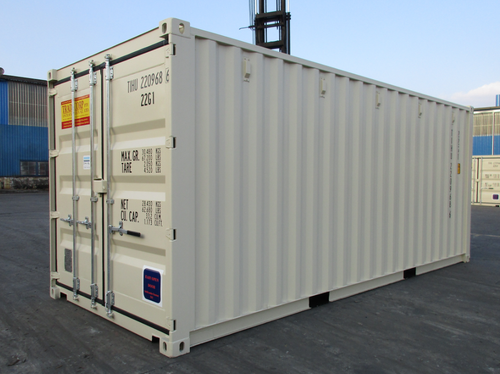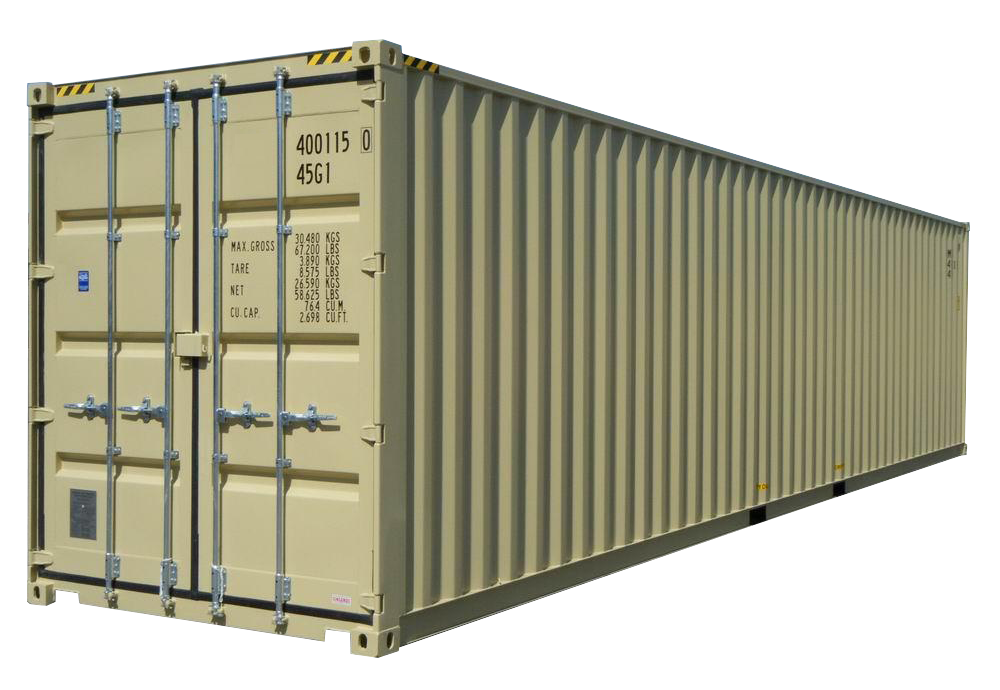6 Must-Know Tips When You Shop New Shipping Container 40 x 8 x 9.6 for Urban Projects
6 Must-Know Tips When You Shop New Shipping Container 40 x 8 x 9.6 for Urban Projects
Blog Article
The Ultimate Guide to Picking the Right Delivery Container for Your Demands
When it pertains to choosing the appropriate shipping container, comprehending your particular demands is vital. You'll want to take into account aspects like dimension, kind, and product to ensure you make the very best choice. From common sizes to specialized alternatives, there's a whole lot to check out. And also, budgeting for both the container and any kind of alterations can make a large distinction. Let's break down the crucial facets to help you discover the excellent fit for your requirements.
Recognizing Shipping Container Sizes
When you're choosing a shipping container, comprehending the numerous dimensions available is vital for making the appropriate decision. Delivering containers commonly come in common sizes of 20 and 40 feet, but you'll likewise discover various other measurements. Knowing the dimension you require depends upon what you intend to store or transport.If you're relocating smaller sized things, a 20-foot container could be suitable, while bigger deliveries often need a 40-foot container. The elevation can also differ; high cube containers provide extra upright room, which can be beneficial for taller goods.Before determining, gauge your cargo, and think about exactly how much area you'll require for filling and dumping. Constantly consider possible future demands-- opting for a somewhat bigger container may save you hassle down the line. Ultimately, selecting the right dimension will certainly enhance effectiveness and guarantee your products are safe and secure throughout transportation
Sorts Of Delivery Containers Available
There are several kinds of delivery containers offered, each designed for particular objectives and freight requirements. The basic completely dry container is versatile, perfect for general cargo. If you're delivering subject to spoiling products, consider a cooled container, which maintains a controlled temperature. For large items, high cube containers offer added elevation, suiting taller loads.If you need to deliver hefty equipment or devices, flat rack containers provide a durable base without walls. Open-top containers allow for simple loading of high cargo, with a removable tarp covering for security. If you're looking for flexibility, consider a retractable container that can be easily stored when not in use.Lastly, specialized containers like storage tank containers are used for fluids, while vented containers are designed for bulk cargo that needs ventilation. Understanding your cargo kind will assist you select the best container to meet your shipping requires efficiently.
Product Factors To Consider for Resilience
When selecting a shipping container, the material plays an essential role in its sturdiness. You'll want to weigh the benefits of steel versus aluminum, particularly pertaining to deterioration resistance. Comprehending these factors can aid you make a more informed selection for your delivery needs.
Steel vs. Aluminum Containers
How do you choose in between steel and light weight aluminum containers for your delivery requires? Beginning by thinking about sturdiness. Steel containers are robust and deal outstanding stamina, making them excellent for hefty tons and severe conditions. They stand up to damages from effects and are commonly more economical, which can be a major element for budget-conscious buyers.On the other hand, light weight aluminum containers are lightweight, which can conserve you on delivery prices. They're simpler to steer and are an excellent choice if you need to move items regularly. Aluminum is generally a lot more pricey and much less durable than steel. Weigh your specific demands very carefully, including weight, price, and the sort of cargo you'll be shipping, to make the ideal option for your circumstance.
Corrosion Resistance Aspects
Choosing the ideal product doesn't just involve weight and price; corrosion resistance plays a substantial duty in toughness. When selecting a shipping container, take into consideration the setting it'll face. Steel containers, while solid, can rust if not appropriately dealt with. Look for choices with protective finishes or galvanization to improve their lifespan. Light weight aluminum, on the various other hand, uses natural rust resistance, making it optimal for seaside locations or damp problems. It can be much more costly. Additionally, analyze the container's usage-- if it'll be subjected to chemicals or rough weather, focus on products that can withstand these problems. Buying a corrosion-resistant container now can save you from pricey repairs or replacements down the line. Select intelligently for long-term benefits.
Alterations and Modification Options
Shipping containers aren't just for delivering products; they can be transformed to fulfill your details demands with different alterations and modification alternatives. You can convert a conventional container into a comfortable workplace, a short-lived retail store, or even a personal gym. The possibilities are almost endless.Think regarding adding windows, insulation, or ventilation to enhance convenience. You could likewise consider electric wiring, plumbing, and even personalized shelving to improve capability. If safety and security's a worry, enhanced locks can give tranquility of mind.For visual charm, you can repaint the container or add a distinct design to make it stick out. Don't ignore flooring options-- whether you want durable why not check here plywood or something much more innovative, it can elevate the space.Ultimately, customizing your shipping container to fit your needs can enhance functionality and develop a distinct setting that reflects your design.
Examining Your Transportation Requirements
When it comes to utilizing your changed shipping container, recognizing your transport needs is essential. Start by determining what you'll be shipping-- whether it's hefty equipment, retail items, or individual items. Each sort of cargo has different needs regarding size, weight, and accessibility.Next, think about the range and setting of transportation. Are you shipping locally, country wide, or globally? This impacts the container's design and performance. If you're utilizing trucks, assure your container fits basic measurements for simple loading and unloading.Additionally, think regarding transit problems. Will your things need special security from weather condition or temperature level changes? If so, you might require insulation or air flow functions in your container.Lastly, evaluate how usually you'll be transporting products. Frequent shipments might need an extra long lasting and versatile container to satisfy ongoing demands. By resolving these factors, you'll be well-prepared to choose the appropriate delivery container for your needs.
Budgeting for Your Delivery Container
Establishing a budget plan for your delivery container is necessary for making certain a smooth buying process. Establish how much you can manage to invest. Rates can differ considerably based on size, problem, learn the facts here now and kind. New containers commonly cost extra, however made use of ones can use considerable savings.Next, take into consideration any extra prices you could sustain, such as transportation costs, distribution costs, and modifications. If you intend to customize the container, variable in those costs as well. Study various providers to contrast rates and discover the very best offer that meets your needs.Don' t neglect to include any permits or laws that might use to your purchase and usage of the container. By plainly detailing your spending plan, you'll be much better prepared to make educated choices, guaranteeing you obtain the right container without breaking the financial institution.
Upkeep and Look After Longevity
To ensure your shipping container lasts for many years, routine upkeep is vital. Beginning by checking the exterior for corrosion, dents, and damage. If you identify any problems, address them immediately to avoid further wear and tear. Tidy the container regularly, both within and out, to eliminate dirt, debris, and dampness that can result in corrosion.Ensure the doors seal properly and oil the hinges to prevent rust and sticking. If you're utilizing the container for storage space, take into consideration adding air flow to decrease moisture and mold and mildew development. For extra protection, use a rust-inhibiting paint or sealer annually.If your container's situated in a severe setting, like seaside locations, you might require to increase maintenance frequency. Watch on the floor covering, also; any kind of signs of wear must be fixed as soon as possible. With these easy steps, you'll expand the life of your shipping container considerably.
Often Asked Questions
Just how Do I Find a Trustworthy Shipping Container Supplier?
To discover a reliable shipping container vendor, start by looking into on-line testimonials, asking for recommendations from friends or industry get in touches with, and contrasting costs. Always inspect their credentials and warranty they use top quality containers that meet your needs.

Can I Rental Fee a Shipping Container Rather of Acquiring?
Yes, you can most definitely lease a delivery container rather than purchasing one. Several suppliers provide rental options, which can save you money and give flexibility if you only need it for a brief duration.
What Permits Are Needed for Container Positioning?

Are Shipping Containers Weatherproof and Suitable for Outdoor Storage Space?
Yes, shipping containers are usually weatherproof, created to hold up against extreme conditions. Their durable building and construction keeps your things protected and completely dry, making them suitable for exterior storage. Just assure appropriate ventilation to avoid wetness buildup inside.
How Do I Move a Shipping Container Once Purchased?

Report this page